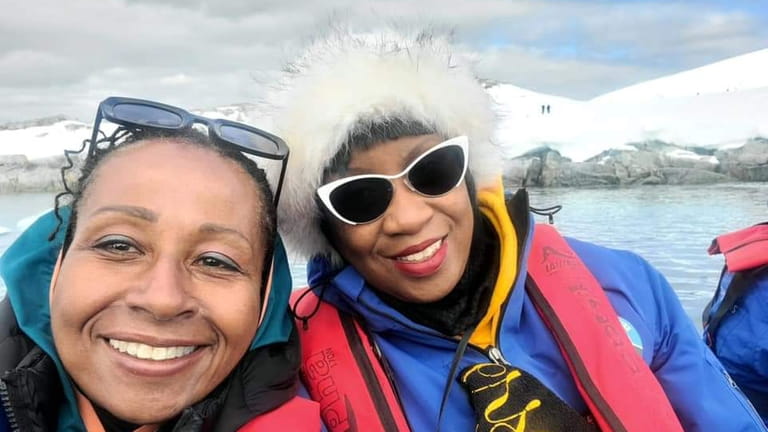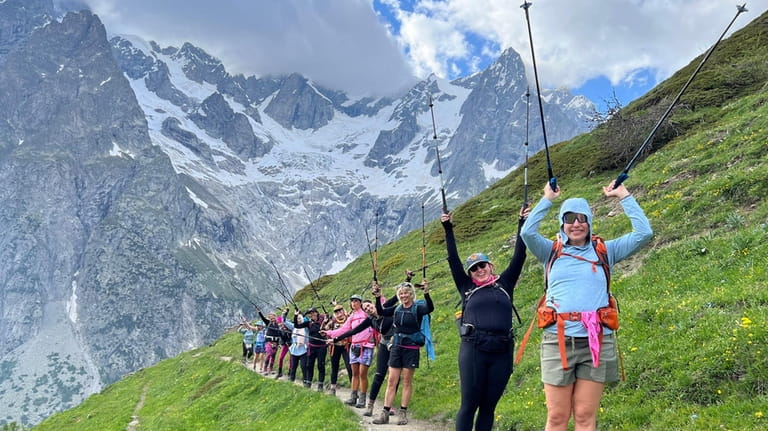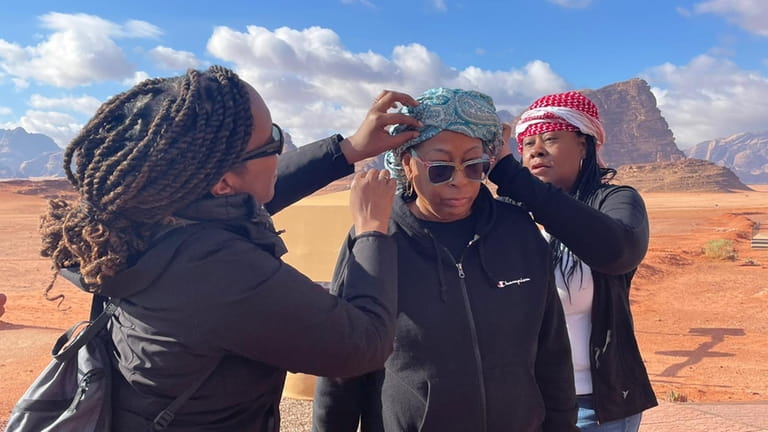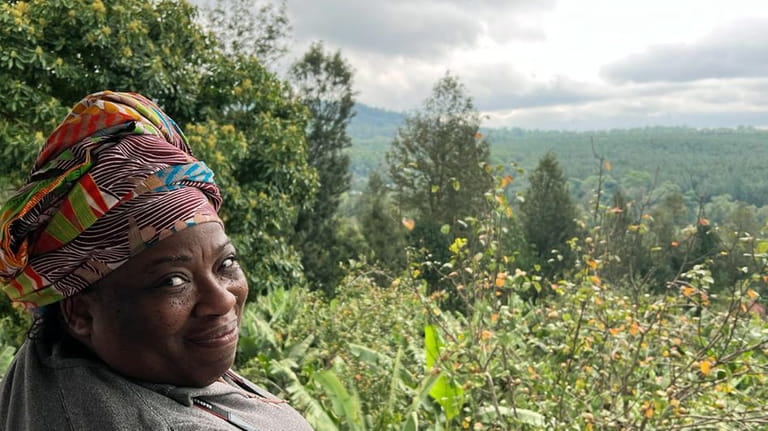Teri McCoy was 44 years old when she first discovered wanderlust.
She was attending a human resources conference in Denver but the mountains, the largest she had ever seen, beckoned on the horizon. “Later, during one of the personal development workshops, I was given a phrase to reflect on about allowing myself to have new experiences,” recalls McCoy. “It all just clicked.”
Since then, she has raced down white-water rapids in Thailand, snorkeled with white tip reef sharks in the Galápagos Islands, and, most recently, gone on a safari in Tanzania, to name a few destinations. Now 51, she never celebrates her birthday at home anymore.
McCoy, an empty nester, is not alone. Women comprise 57% of travelers who book through global travel companies, according to the Adventure Travel Trade Association. When the travel company is women-led, such as Wild Women Expeditions (WWE), Adventure Women or Sisters Traveling Solo, that number jumps to 64 percent. Estimated to be worth $2 trillion by 2032, the global adventure tourism industry is expanding rapidly, and women are a big part of that growth. They are not afraid to travel alone or to great heights.

Women on a Sisters Traveling Solo trip kayak near glaciers in Antarctica in 2022. Credit: Sisters Traveling Solo
“We definitely see a lot of travelers in their 40s and 50s prioritizing adventure travel for themselves,” says Allison Fleece, co-founder of WHOA Travel (an acronym for Women High on Adventure). The company offers women-only group trips where travelers work together to accomplish a goal, such as hiking to the top of Kilimanjaro or trekking alpine landscapes on the Tour du Mont Blanc. “It’s not a beach vacation our travelers are after when they choose to travel with us. There’s usually a greater purpose involved.”
Older women, defined as over 65, represent the greatest recent increase in solo travel, going from 4% in 2019 to 18 percent in 2022. “During the pandemic there was so much loss; now there’s this underlying current of ‘Go do things now,’” says Kristi Marsh, marketing director of Adventure Women, a company founded in 1982 to help women explore the outdoors.

Women hike the Tour du Mont Blanc in France on a trip organized by WHOA Travel in June. Credit: WHOA Travel
“Right now, our big trips are Galapagos, Iceland, the Northern Lights, Egypt, Jordan, Morocco,” Marsh says. The complete roster includes more than 50 trips a year for groups of 12-to-14 women traveling to 65 countries. The cost of trips typically ranges from $5,000 to $6,000. Bookings are 20% higher than they were in 2019.
Different types of adventure
Some kinds of adventure travel are associated with hardship, such as Cheryl Strayed hiking alone on the Pacific Crest Trail. But other popular adventure trips involve learning about local culture or being in natural environments with amenities.
“Cultural trips are for people who want to do less touristy stuff and want to interact with local people,” says Cole Banks, who started her business, Sisters Traveling Solo, in 2015. “For instance, in Ghana, instead of a regular cooking class, we go to the homes of families within Ghana, make a Sunday meal and sit down and have dinner with their family.”
Sisters Traveling Solo offered two trips in its first year; now it offers 35 trips per year in four categories — traditional, cultural, wellness and solo. Depending on lodging and length of stay, trip costs range from $1,900 to $3,800. When Banks asked the 80,000 members of her Facebook group recently why more women in their 50s are traveling, respondents said they have more time and more money to do it now.

Travelers prepare for camel rides and climbing sand dunes in the Wadi Rum in Jordan. Credit: Sisters Traveling Solo
“Originally I started the Facebook group for other women of color who like to travel solo, and we’d post about our trips and suggest travel companies,” says Banks. “After a while, I figured, ‘Why send all that business to other people?’”
Like Banks, Rebecca Garland started her travel company Fit & Fly Girl, in an effort to find female travelers. She was inspired by her own adventures, such as a surfing and yoga retreat in Bali or a boot camp in Tulum, Mexico.
“While I was sitting on the beach one day in Tulum, I came up with the idea for Fit & Fly Girl,” Garland says. “Instead of being tied to one location, we would be a traveling retreat company offering retreats in different locations, we would be geared toward women only, and fitness would be one of the central components. Back then, there were a lot of yoga retreats but not as many fitness-focused retreats, especially for women only, so that felt like a fun niche.”
Before the pandemic, Fit & Fly Girl offered eight to 12 retreats a year, but after 2020, the company pulled back to host four to seven retreats per year. The most popular locations are Mykonos, Greece; the French Riviera; Iceland; Morocco and Costa Rica. Garland says Fit & Fly Girl travelers range in age from 19 to 78. For travelers interested in non-fitness retreats, the company also offers Fly retreats with itineraries focused more on cultural activities, exploring cities and enjoying a region’s food and wine.
“Since we began hosting retreats, the age ranges of our guests, in order of most to least, are: 40s, 50s, 30s, 60s, 20s, 70s,” she says. “Our most repeat guest who has attended eight of our retreats is in her early 70s.”
Budget options
For the cash-strapped traveler, work programs are still an option. World Wide Opportunities on Organic Farms, known as WWOOF, matches applicants with organic farmers all over the world looking for part-time workers. In exchange for free lodging, travelers can live and work on the farms while exploring the country during their time off. Other travelers sell freelance writing or photography to offset travel costs.
Jules Torti, a massage therapist, chose volunteer work to pursue her love of travel. “I had some primatology skills and a love of animals, but I didn’t want to go back to school,” she says. She applied for a volunteer opportunity at the Jane Goodall Institute in Uganda, and then followed it with another opportunity in the Democratic Republic of Congo.
“Volunteering allowed me to experience those countries so intimately,” Torti says. “Though I wasn’t earning any money, my output [expense] was super low as well. In the Congo, my accommodations and meals were provided, though the flight was over $1,600 even back in 2008.”
Sixteen years later, Torti still travels at least twice a year, now with her wife, and two years ago she joined Wild Women Expeditions, or WWE, as a content creator. So far she has traveled to Croatia, Indonesia, Chile and most recently, Switzerland, with the company.
McCoy frequently books trips with WWE as well, choosing some of the excursions in over 30 countries for small groups of women. The cost ranges widely based on the location and the length of stay. An eight-day kayaking adventure in Baja, Mexico, starts at $2,995, while the 17-day trip through the Northwest Passage in the Arctic Ocean starts around $13,500. These prices do not include airfare.

Teri McCoy visits Mama Anna’s women’s cooperative, near Mount Meru in Tanzania. Credit: Teri McCoy
Some arrive with a friend, but most, like McCoy, are traveling solo and meeting each other for the first time. “I interacted with a few [other travelers] online before the trip, but I had not met them in person,” McCoy says of her trip to Thailand in 2018. “Relatively quickly we realized we’re all like-minded, wanting adventure, and there for the same reason. We went river rafting and tipped our boat. That experience definitely created some lasting friendships.”
Since 2018, she has taken eight WWE trips with a total price tag falling somewhere between $50,000 and $75,000. “Travel is very high on my list of priorities when I budget,” she says. “It fuels me and it helps me grow, so I make it a part of my financial plans. It’s not discretionary.”

